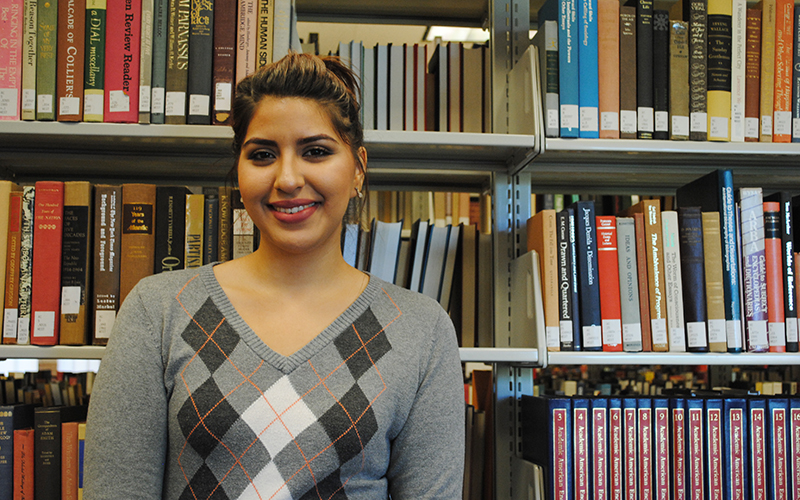
Janet Castillo has focused mainly on theater and politics in the new Latin American studies program at Arizona State University’s West campus. (Photo by Hope Flores/Cronkite News)
As President-elect Donald Trump approaches his inauguration amidst promises of immigration reform, it is unclear what impact potential changes would have on relations between the U.S. and Latin America, and how that would play out in Arizona.
One group that is deeply immersed in topics like these: students of Latin American studies programs and those who teach them at all three Arizona state universities.
They study the culture, history, politics and experiences of Latin Americans in Latin America and in other places, including the United States.
Northern Arizona University offers a Latin American studies minor, and Emily O’Neil graduated from the program in 2014. She said Latin American studies helped her form a well-rounded view of why people migrate, the historical context of migration into the states and the failures of U.S. border policies.
“Arizona was a part of Mexico for most of its history,” she said. “Our communities have many native Spanish speakers, including immigrants and people who have lived in Arizona since its time as Mexico. I think learning about this history and culture in LAS helps foster better relationships and understanding between Hispanic and non-Hispanic communities.”
Investing in LAS programs in Arizona
According to Data USA, 972 people graduated from U.S. universities with degrees in Latin American studies in 2014. The most came from the University of Pittsburgh with 55 graduates. Three were from Arizona State University and 27 graduated from the University of Arizona.
Enrollment in Latin American studies programs in Arizona has varied over the past few years.
These numbers do not include students who take individual courses without declaring the major. Course enrollment could be much higher.
NAU recently hired additional Latin Americanists in history, ethnomusicology, politics and international affairs. ASU also launched a new program on its West campus in January. The university has had a Latin American studies program on the Tempe campus.
Ilana Luna, an assistant professor of Latin American studies, and Claudia Villegas-Silva, an assistant professor of Latin American studies, designed the new program to include more of an interdisciplinary approach.
“We encourage people to go abroad, to get a different perspective, not to cross borders in some divisive way but to explore the world, live, recognize that our shared humanity far outweighs our differences, but our differences are important and we have to confront them with respect,” Luna said.
Janet Castillo will be the first student to graduate from the new ASU program. She originally majored in health sciences, but she decided to change last year.
“I am Chicana, Latina, so I felt that I would be able to connect and do something with that, with my people, with my culture,” she said.
Castillo said she has lived in Arizona for 11 years and has noticed a lack of integration of Latino culture in the state.
“I feel like no one really understands the Latino culture,” Castillo said. “I definitely think it’s important, especially here in Arizona, because it’s not exactly accepting of Hispanic culture.”
Latin American studies has been a controversial topic in Arizona. Legislation was passed in 2010 that restricted “ethnic studies” in school districts and charter schools.
The bill prohibited classes that “promote the overthrow of the U.S. government,” “promote resentment toward a race or class of people,” “are designed primarily for students of a particular ethnic group” or “advocate ethnic solidarity instead of the treatment of students as individuals.”
Luna said that’s not what their Latin American studies program is designed to do.
“Some people say, ‘We don’t want to support racial pride,'” Luna said. “And I want to make it clear that this major is not apolitical in the sense that it absolutely addresses history and politics, but we have no horse in the race, we’re not pushing some agenda.”
Looking toward the future
The LAS departments at the three Arizona state schools have seen students from a variety of backgrounds pass through their programs.
Villegas-Silva said that a deeper understanding of Latin American history and culture can help inform current conversations including possible debates about immigration and foreign relations.
“Critically question that which is out there,” she said. “It makes for a better voter, a better human being.”
The Data USA numbers show that the most common job for someone with a Latin American studies degree is an elementary or middle school teacher, the highest paid are physicians and surgeons, and the most specialized are archivists, curators and museum technicians.
O’Neil is a special education aide at a charter school in the Valley, but she said she hopes to work in a field more related to Latin American studies down the road.
Castillo plans to graduate in May and hopes to go to graduate school and work in marketing or business, but she first wants to travel Latin America.
“I feel like I’ve kind of found myself culturally and with my education,” she said. “I think I know what I’m heading towards now. I’ve been able to connect with all of the subjects that I’ve learned about and just to grow on my own.”
Editor’s note: A previous version of this story misspelled Emily O’Neil’s name and incorrectly identified her occupation. She is a special education aide at a charter school in the Valley. The story here has been corrected, but clients who used earlier versions are asked to run the correction that can be found here.